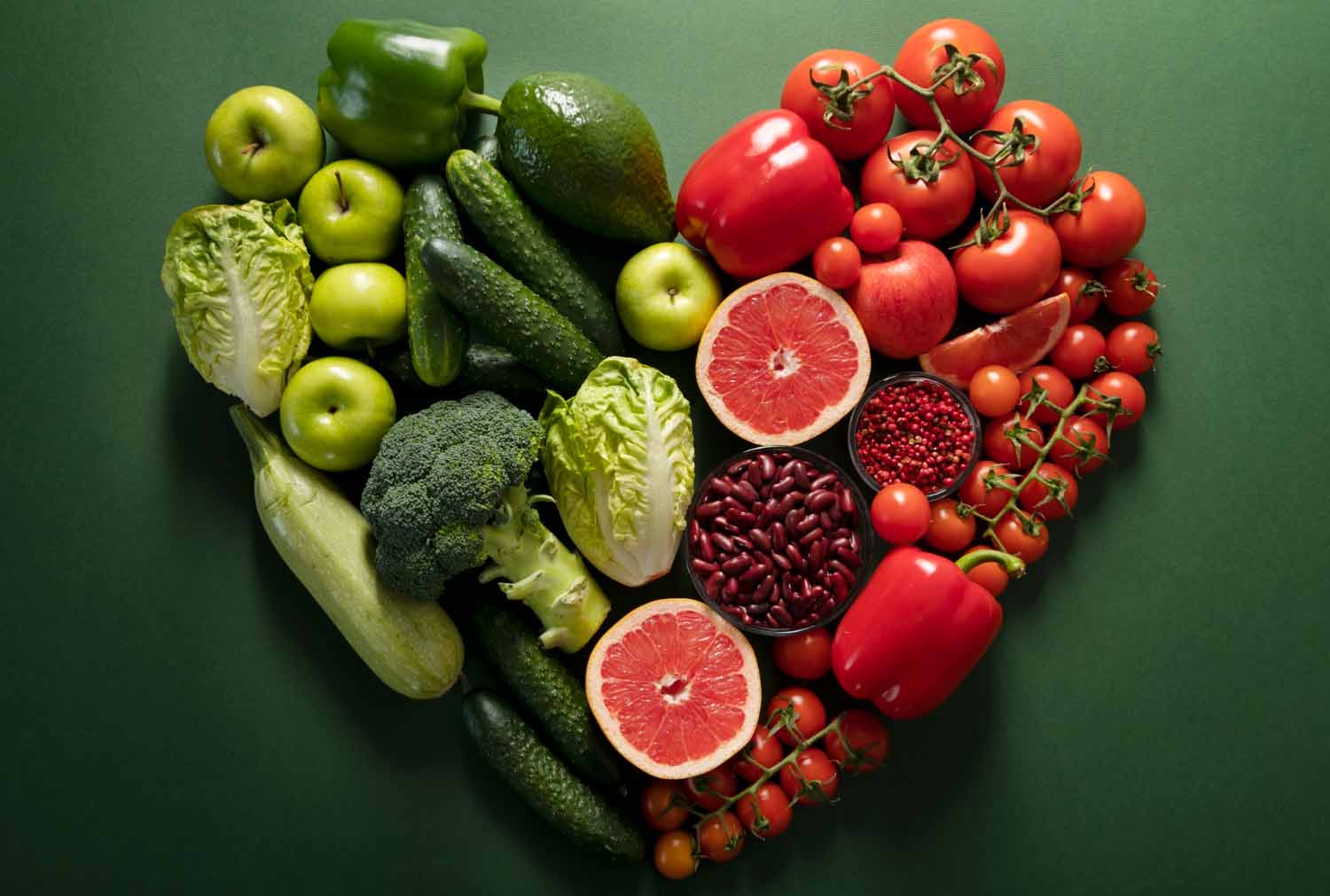When it comes to promoting heart health, incorporating the best low cholesterol foods into our diet is an essential step. These foods not only help maintain our cholesterol levels but are also packed with essential nutrients. In this section, we will explore a wide range of delicious foods that can be easily incorporated into your daily diet to promote heart health. Read on to discover the best low cholesterol foods you should add to your grocery list today!
The Importance of a Low Cholesterol Diet
A low cholesterol diet is crucial for maintaining a healthy heart and reducing the risk of heart disease. High cholesterol levels can cause blockages in the arteries, making it harder for blood to flow to the heart. This can lead to serious health consequences, including heart attack and stroke.
Incorporating low cholesterol foods into your diet, such as fruits, vegetables, whole grains, and lean proteins, can help lower cholesterol levels and promote heart health. These foods are rich in nutrients and fiber, which can help reduce the absorption of cholesterol in the body.
It’s also important to limit your intake of saturated and trans fats, which can raise cholesterol levels and increase the risk of heart disease. These unhealthy fats are commonly found in processed foods, fried foods, and fatty meats.
“A healthy diet and lifestyle are key components of reducing the risk of heart disease.” – Dr. Jane Jones, Chief Cardiologist
By adopting a low cholesterol diet and incorporating healthy habits into your lifestyle, you can take control of your heart health and reduce the risk of heart disease. We’ll explore some of the best foods for maintaining a low cholesterol diet in the next section.
Best Foods for Lowering Cholesterol Levels
Lowering your cholesterol levels can be accomplished through a balanced diet that includes heart-healthy foods. Here are some of the best foods to consider:
| Food | Cholesterol-Lowering Effect |
|---|---|
| Oats and oat bran | Contain beta-glucan, a soluble fiber that reduces absorption of bad cholesterol in the bloodstream. |
| Salmon and other fatty fish | Rich in omega-3 fatty acids that help lower triglycerides and reduce inflammation in the arteries. |
| Nuts | Contain plant sterols that help block cholesterol absorption in the gut. Almonds, walnuts, and pistachios are particularly high in plant sterols. |
| Fruits and vegetables | Loaded with soluble fiber, vitamins, and minerals that promote overall health. Examples include apples, berries, oranges, broccoli, spinach, and kale. |
| Beans and legumes | Rich in soluble fiber and protein, which can help reduce cholesterol levels and lower blood pressure. Lentils, chickpeas, and black beans are excellent options. |
| Whole grains | Provide fiber, minerals, and antioxidants that improve heart health. Brown rice, quinoa, and whole-wheat pasta are great choices. |
| Lean proteins | Include skinless chicken, turkey, and tofu. These options are low in saturated fat and can help maintain muscle mass. |
By incorporating these cholesterol-lowering foods into your diet, you can take charge of your heart health and improve your overall well-being. Remember to consult with a healthcare professional or registered dietitian for personalized advice and to ensure your dietary needs are met.
The Nutritional Power of Fruits and Vegetables

Fruits and vegetables are amongst the most powerful weapons in your arsenal against cholesterol. Packed with fiber, vitamins, and antioxidants, this food group can deliver a staggering punch to your cholesterol levels.
The Green Brigade: Vegetable Champions
Some vegetables, especially leafy greens, are anti-cholesterol superheroes.
- Broccoli: This nutritional powerhouse is packed with fiber that can help lower cholesterol levels.
- Spinach: Spinach holds a special compound called lutein, known for protecting against age-related macular degeneration and heart attacks.
- Brussels sprouts: These mini cabbages carry plenty of fiber and antioxidant properties.
“Eating a diet rich in leafy greens can offer numerous health benefits including reduced risk of obesity, heart disease, high blood pressure, and mental decline.”
The Sweet Escape: Fruity Wonders
Contrary to what some diet myths might tell you, fruits are an excellent addition to a low-cholesterol regime.
- Berries: Be it blueberries, strawberries, or raspberries, berries are rich in soluble fiber, which helps to reduce cholesterol levels.
- Pomegranates: These seedy delights are a powerful source of antioxidants, known to keep bad cholesterol (LDL) from building up.
- Apples: An apple a day can indeed keep the doctor away, thanks to its high fiber content and the antioxidant quercetin.
Proteins: Building Blocks For a Low-Cholesterol Life
If you thought a low-cholesterol diet means saying goodbye to proteins, think again. The key is to choose lean proteins over their greasy counterparts.
Meat, Seafood, and Alternatives
- Lean poultry: Skinless chicken and turkey provide high-quality protein without the cholesterol of red meat.
- Fish: Tuna, salmon, and mackerel are excellent sources of omega-3 fatty acids, which can lower your total cholesterol level.
- Legumes: Beans, lentils, and peas are plant proteins with plenty of fiber, vitamins, and minerals.
Egg-citing News for Egg Lovers
While eggs have been notoriously famous for their high cholesterol content, recent research has eased this perception.
“Moderate egg consumption, which is about one egg per day, does not increase heart disease risk in healthy individuals and can be part of a healthy diet.” – Harvard School of Public Health
Tips for Incorporating Low Cholesterol Foods into Your Diet
Transitioning to a low cholesterol diet may seem daunting, but with a little planning and creativity, it can be a seamless and enjoyable experience. Here are some practical tips and strategies to help you incorporate more heart-healthy foods into your daily meals:
1. Start with small changes
You don’t need to overhaul your entire diet overnight. Begin by making gradual changes such as substituting high-fat meats with leaner options like turkey or chicken, switching from refined to whole grain bread, and incorporating more vegetables into your meals.
2. Experiment with new recipes
Trying out new recipes can make low cholesterol dining more exciting. Look online or in cookbooks for delicious dishes featuring heart-healthy foods, such as salmon, tofu, beans, and nuts. Don’t be afraid to add your own twist to a recipe to make it more to your liking.
3. Meal prep for the week
Preparing meals in advance saves time and ensures you have healthy options readily available. Plan your meals for the week, make a shopping list, and prep ingredients in advance. You can also cook larger batches and freeze portioned meals for later.
4. Use herbs and spices to add flavor
You don’t need to rely on salt or high-fat condiments to add flavor to your meals. Experiment with fresh or dried herbs, spices, and citrus to enhance the taste of your favorite dishes. Garlic, ginger, paprika, and cilantro are all great options.
5. Mind your portions
Even with low cholesterol foods, portions still matter. Using smaller plates and measuring out servings can help you avoid overeating. Aim for a balance of protein, carbohydrates, and healthy fats in each meal.
6. Don’t be too hard on yourself
Adopting a low cholesterol diet is a journey, and it’s okay to slip up or indulge in your favorite treats once in a while. Remember to focus on progress, not perfection, and celebrate your achievements along the way.
By implementing these tips, you can make low cholesterol eating a sustainable and delicious part of your healthy lifestyle. Bon appetit!
Conclusion
Adopting a low cholesterol diet is a simple yet effective way to prioritize your heart health. By incorporating the best low cholesterol foods into your daily meals, you can maintain a healthy and balanced diet while reducing your risk of heart disease and other health issues.
Remember to consult with a healthcare professional or registered dietitian for personalized advice and the assurance that your dietary needs are being met. Making sustainable changes to your eating habits may take time, but it can be an enjoyable and rewarding journey towards a healthier lifestyle.
Thank you for taking the time to learn about the importance of a low cholesterol diet and how to incorporate these foods into your daily meals. We hope this article has provided you with valuable insights and inspiration on your quest to achieve optimal heart health.



Best Low Cholesterol Foods for a Healthy Diet